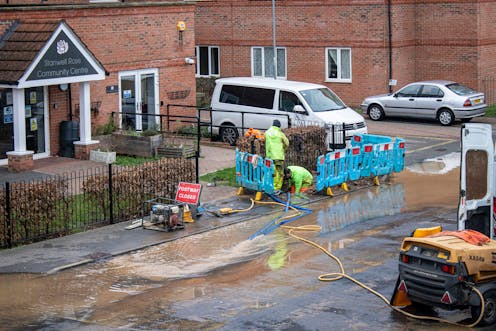
Prolonged periods of intense heat affected large parts of the UK and Europe this summer. These conditions forced parts of the UK into an official drought, with restrictions on water use imposed for the first time since 2012. Despite recent autumnal weather, parts of the country remain firmly in drought.
Droughts are increasingly a feature of the UK’s climate. The UK has experienced at least three major drought episodes since 2000. The risk has grown so acute that, unless action is taken, in around 25 years England will be unable to supply its own water needs.
This threat has materialised faster than many anticipated. England’s reservoirs reached their lowest level since 1995 this summer. Regardless, some water companies resisted calls for usage restrictions.
To ensure it is equipped to deal with future challenges, the UK’s water industry requires reform. To do this, we should look to regions where water is already scarce. In California, for example, shared knowledge is ensuring that water is managed in a responsible and sustainable way.
Why is the water industry not working?
England and Wales are the only countries in the world with a fully privatised water industry. There are only two dozen water companies across England and Wales. Each is granted a licence to operate from the industry regulator, Ofwat, and holds a regional monopoly making them responsible for providing water for a particular geographical area.
This structure, combined with high infrastructure costs, restricts the chance for new companies to enter the market. Meanwhile consumers are unable to switch providers. With competition thus limited, water companies can get away with minimal investment. Investment in critical water infrastructure has been slashed by up to a fifth over the past 30 years as a result.
Subsequently, leakage rates are high. Despite recent efforts to address leakage, Thames Water still loses 600 million litres of water each day.

Maintenance also happens slowly. A past report concluded that it would take Thames Water 357 years to renew its network. Yet pipes have a lifespan of only 50 years.
This situation is exacerbated by weak regulation. The sector has a small number of actors, comprised of water companies, consultancies and regulators. Workers frequently move between these organisations.
Such impartiality interferes with regulatory decisions as former water company employees turned regulators may not wish to inflict excessive strain upon former colleagues. As customers’ water bills rose, Anglian Water paid a £92 million dividend to its owners in June, a payout within its regulatory limits.
Distrust has also become a key feature of the UK’s water industry, impeding its ability to function effectively. Numerous scandals, including the discharge of sewage into water sources and the imprudent award of bonuses have aggravated customers. Attempting to appease customers, water companies are reluctant to agree to further compromises over service quality.
Even then a lack of dialogue between water companies and the public restricts understanding of water scarcity. This fuels the popular perception of the UK as a “wet” country, which may contribute to the public’s low willingness to restrict their own water use.
Whipping water companies into place
Despite the industry’s continual failure to service society’s water needs, consecutive governments seem set on not nationalising. How does research instead suggest the UK can fix its broken private water model?
There is currently little room for public contribution to water resource management. However, local communities often have an abundance of knowledge regarding water resources. This includes records of localised water level, seasonal water flow, and weather data.
Research indicates that shared knowledge can enhance water management. One option is water stewardship.
Water stewardship is the concept of using water in a socially responsible, sustainable and economically beneficial way. This is achieved by including various stakeholders including government, businesses and commmunity groups throughout the management process. This ensures the development of strategies that account for a range of shared water-related risks.
Water stewardship is being used with success in California, which is currently experiencing its second extreme drought in ten years. The California Water Action Collaborative brings together environmental groups, agricultural producers, and major companies operating in California to pursue collective projects to improve the region’s water security.

The management of the Cosumnes river in northern California is one such project. Here, the Freshwater Trust, a Californian conservation group, are collaborating with regional stakeholders to develop a recycled water plant to irrigate more than 16,000 acres of agricultural land in the Sacramento region. The plant will also support drinkable water supplies in the region in the future.
In such ways, the Californian public contribute to management and actively engage water companies in conversation. This will ensure greater resilience towards drought, but also increase the acceptability of drought management measures such as usage restrictions.
The UK’s water sector is clearly not working. The need for an industry that does not shirk responsibility for water management will become clear as water insecurity becomes an increasing feature of life. As shown in California, through collaboration it is possible to re-establish the value of water.
Kevin Grecksch has received funding from NERC, ESRC and the British Academy.
This article was originally published on The Conversation. Read the original article.







